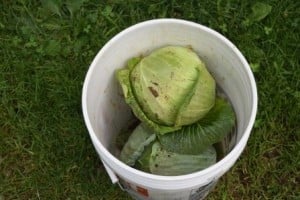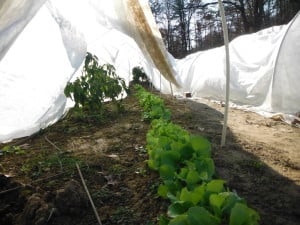As we move into the fall and summer is past, as the days shorten and the nights get cooler, it’s easy to think that the garden is over and all we have to do is hope that next year’s weather will be more moderate than this past season has been. Some of our gardens did fairly well this year with cellars and basement shelves filled with canned tomatoes, beans, pickles, peppers, and bins of potatoes. Others were filled with some disappointment as the weather and the inability to find organic fertilizer reduced what we were able to produce. But the year is not over for some. In my own small plot I still have banana and bell peppers, does anyone need peppers? The collards and kale are plentiful and just last night I picked over a bushel of mustard greens? Tomorrow I will pick the last of the beans and okra and hope that the lettuce and spinach will stop bolting. My fault as I was out of the garden at the Brushy Fork Institute in Berea. Actually, that is where I first heard of Grow Appalachia and met David and Mark. But the garden work is not done for this year. I have sweet potatoes to dig and Brussel sprouts in abundance. Evenings will be spent in blanching and freezing the cole crops for the winter. The question is when do I set out the low tunnels so I can still have fresh greens even in January?
Yesterday I was watching the Victory Garden and they mentioned a master gardener. I wonder, what qualifies someone to be a master gardener? While I know a few things and I seek to learn more, I wonder if a gnome will suddenly appear among the turnips, tap me on the head and poof. But no, I think my days and years will be spent learning a little more each season and trying new ways. I do know that I have expanded my horizons already. The first time I canned was last year. The first time I intentionally ate kale was last year. The first time I planted a garden larger than ten square feet was last year. This year, I will try beets, grown in my own garden, for the first time since I was probably six or seven. I wonder if they will bleed all over the plate like I remember? Pickled peppers will be a first in the next week or so as will be the pickled okra. The indoor lights I constructed this past spring worked far better than I expected, and so this winter, the planting trays will be re-washed and the seeds set, ready to be transplanted as spring arrives. It’s trial and error for sure. The cooler was filled with cabbage and salt water, the cheese cloth was in place and the plastic cutting board set atop. They said it needed to be weighted down so the lead diving weights were double bagged and all was set. The mold was scraped and all was well until time to unveil the sauerkraut? The bags had somehow leaked and I have to suspect the acidity and the lead did not mix well. Oh it smelled so good as it went in the dumpster. A proper crock is on the way. Why did I not plant a fall crop of cabbage?
 Note for next year. Just one note among many, learning, trial and error, learning, no master and certainly not enough years left to ever have anyone pin that title on me, but as I said in an earlier post, I believe gardeners are next year people hoping for more and better than in the past.
Note for next year. Just one note among many, learning, trial and error, learning, no master and certainly not enough years left to ever have anyone pin that title on me, but as I said in an earlier post, I believe gardeners are next year people hoping for more and better than in the past.



Leave A Comment